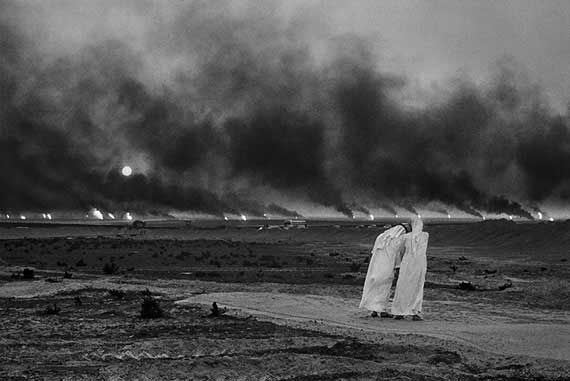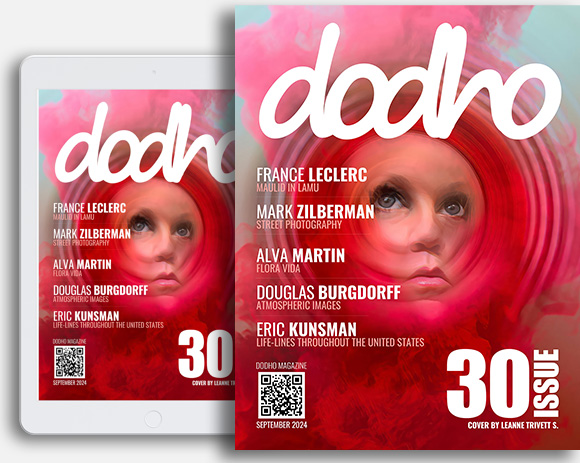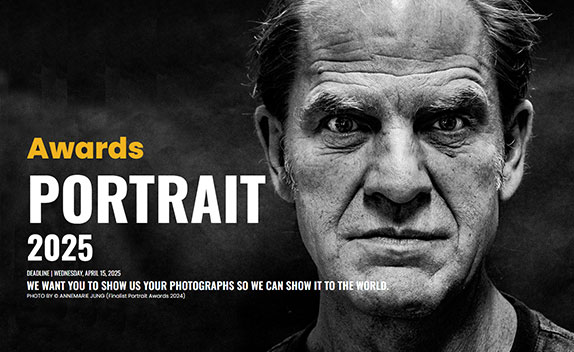La Photographie Gallerie presents a stunning series of images by acclaimed photographer Sebastião Salgado depicting the burning Kuwaiti oil fields of the 1991 Gulf War.
Sebastião Salgado was born on 8 February 1944 in Aimorés in the Brazilian state of Minas Gerais, and currently lives in Paris with his wife and greatest accomplice, Leila Wanick Salgado.
Having trained as an economist, he went on to a career as a photographer. He began working as a photographer in Paris from 1973 onwards, through the Sygma, Gamma and Magnum Photos agencies. In 1994, he and his wife Leila set up their own press agency, Amazonas Images, created exclusively for his photographic work.
He has travelled more than a hundred countries for his photographic projects which, in addition to their numerous appearances in the press, have been published in books such as Other Americas (1986), Sahel: The End of the Road (1986), Workers (1993), Terra (1997), Migrations and Portraits (2000), Africa (2007), Genesis (2013) and Kuwait (2016). Touring exhibitions of these works have been, and continue to be, organised across the globe.
Sebastião Salgado has been awarded numerous photographic prizes. He is also a UNICEF Goodwill Ambassador and an honorary member of the Academy of Arts and Sciences in the United States. In 2016 Salgado became a member of the Académie des Beaux-Arts of the Institut de France, appointed to the seat previously occupied by Lucien Clergue. The same year he was made a Knight of the Legion of Honour, France.
Of his many projects, Genesis, which he began in 2004, is undoubtedly one of the most extensive. For this reason, the book was only published in 2013, some eight years later. He creates photographic series of landscapes, flora, fauna and human communities which are still living according to their ancient cultures and traditions. This work is intended as an investigation into nature in its original, unspoiled state. The magnificent book which came out of this project is a work which brings together thirty journeys and over two hundred images. Genesis is Salgado’s paean to the beauty of the planet, a heartfelt “love letter to our planet”.
Lélia and Sebastião have been working together since the 1990s on re- establishing the environment in a small part of the Atlantic Forest in Brazil, in the state of Minas Gerais. They started to return a piece of land which they owned to its natural state and in 1998 they turned the land into a nature reserve and created the Instituto Terra, the aim of which is to encourage reforestation and education about the environment.
In 2014, Wim Wenders and the photographer’s son, Juliano Ribeiro Salgado made a documentary about Sebastiano Salgado’s work, The Salt of the Earth, which was awarded the Un Certain Regard Special Jury Prize at the Cannes Festival in 2014. It was also nominated for the Best Documentary, Feature Academy Award at the Oscars in 2015.

The Exhibition “Kuwait: A Desert on Fire”
“It felt as if the end were nigh. With the sun obliterated by dark smoke, a Dantean landscape stretched as far as the eye could see. The horizon itself was marked by torches of fire, where burning oil leapt from the lifeless desert.”
The “Kuwait: A Desert on Fire” exhibition presents thirty photographs of the burning oil fields. These striking visual images were taken by Sebastião Salgado after the Gulf War. They show the ravaged landscapes in which oxygen was beginning to run out, a blackened desert and, most striking of all, the superhuman efforts of the oil-soaked Canadian firefighters. This portfolio is both a tribute to their courage in the face of adversity and a photo reportage on the environmental and economic catastrophe sparked by the conflict.
It was whilst Salgado was in Venezuela completing Workers: An Archaeology of the Industrial Age, his worldwide collection of images showing industrial and agricultural activities still dependent on human labour, that he learned of the Kuwait oil field fires. Thinking that the abundance of Kuwaiti oil was lowering the international price-per-barrel, Saddam Hussein ordered his troops to set fire to their oil wells with the intention of pushing up oil prices and reducing aerial visibility for the American military.
The world knew that the US was preparing to drive the Iraqi army out of Kuwait. His success marked the beginning of a period of instability right across the Middle East, a situation which still persists today. It is partly for these reasons that we felt it relevant and indeed vital to revisit these events through the extraordinary work of Sebastião Salgado. All the more so now that history seems to be repeating itself in Iraq under Daesh.
The book “Kuwait: A Desert on Fire”
Salgado’s epic images were first published in the New York Times Magazine in June 1991 and won the Oskar Barnack Award, which recognisesphotography expressing the relationship between humans and theenvironment.
Kuwait. A Desert on Fire is the first monograph devoted tothis incredible series. Similar to Genesis, Exodus and Children, it is as much a major document of modern history as an extraordinary collection ofphotographic works.
Sebastião Salgado. Kuwait. A Desert on Fire
Sebastião Salgado, Lélia Wanick Salgado
Hardback, 31.8 x 29 cm, 208 pages
ISBN 978-3-8365-6125-9
Multilingual edition: German, English, French
ISBN 978-3-8365-6126-6
Multilingual edition: Spanish, Italian, Portuguese
€ 49.90
Sebastião Salgado. Kuwait. A Desert on Fire
Print run of 1000 copies + 180 ACs
Sebastião Salgado, Lélia Wanick Salgado
Deluxe Hardback in presentation case, 45 x 41 cm, 188 pages
€ 800.00 XXL
ISBN 978-3-8365-6127-3
Edition: English
La Photographie Galerie
25 May – 16 Sep 2017
100 rue de stassart
1050 Brussels






